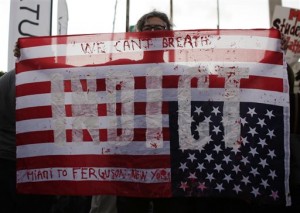The dirty, little secret about grand jury proceedings
By: DOLAN MEDIA NEWSWIRES//December 17, 2014//
The dirty, little secret about grand jury proceedings
By: DOLAN MEDIA NEWSWIRES//December 17, 2014//
By Bruce Singal
Dolan Media Newswires

By the time Prosecuting Attorney Robert McCulloch first addressed the St. Louis County grand jury in the case involving Darren Wilson’s fatal shooting of Michael Brown, the jury had already sat weekly for nearly four months hearing more mundane cases.
“Obviously, it is going to be different from a lot of the other cases that you’ve heard … during your term,” McCulloch told the jurors of their investigation of the Ferguson, Mo., police officer.
McCulloch was right on target.
The proceedings he led stood in stark contrast to the usual grand jury process, in which the prosecution presents a streamlined version of its case, asks the jury to return a specific indictment, and the jury obliges in rubber-stamp fashion.
But the grand jury investigation of Wilson was indeed different. The prosecutors presented the jury with every shred of voluminous evidence concerning the shooting. Rather than requesting a specific indictment, the prosecution offered five possible indictments, ranging from murder in the first degree to involuntary manslaughter in the second degree. And they did not advocate for any of them, leaving the unguided grand jury to its own devices.
The result: The grand jury voted “no” on each of the five indictments (meaning none of them garnered the necessary nine out of 12 total votes).
The refusal to indict a white police officer for fatally shooting an unarmed black teenager has led some to ask if the grand jury was rigged to achieve that result. But the dirty little secret (at least to most people who do not toil in the criminal justice system) is that virtually every grand jury vote — state and federal — is “rigged,” in that it procures the outcome the prosecutor seeks. Invariably that outcome is the specific indictment requested by the prosecutor.
But, here, the prosecutors trumpeted their neutrality and sought to demonstrate it by taking no position on any possible indictment. Their aura of neutrality, however, was belied by telltale signs of partisanship favoring Officer Wilson and encouraging a no bill vote on all charges.
The prosecutors’ examination of Wilson was friendly and gentle, emphasizing favorable points and refusing to challenge vulnerable ones. The instructions of law that the prosecutors gave to the grand jury primarily emphasized the two possible defenses available to Wilson and the need to negate them in order to indict.
And the prosecutors’ refusal to ask the grand jurors to indict Wilson on a specific charge — in contrast to their practice in scores of other cases over four months — could not help but signal to the overwhelmed grand jury that this case was indeed “different” from all the others they had heard and had voted to indict at the prosecutors’ request.
So the grand jurors were left to deliberate five possible indictments. They had inadequate explanations on any of them, and the uncharacteristically agnostic prosecutors effectively telling them, “Good luck; go figure it out for yourselves.” Never before, it is fair to surmise, had this grand jury been asked to truly deliberate.
Under such circumstances, it is unsurprising, if not predictable, that the jurors would not indict. Had the prosecutors followed the ordinary practice and asked the jury to indict Wilson on a specified charge, it is nearly unthinkable that it would have rebuffed them.
So, was the Ferguson grand jury indeed “rigged?” Yes it was, in that it achieved the results the prosecutors desired. In that way, it was the same as any other grand jury. It’s just that these prosecutors preferred a different result than most.
Bruce Singal is chairman of the litigation department at Donoghue, Barrett & Singal in Boston. He is a former assistant U.S. attorney in Boston.
Legal News
- Former law enforcement praise state’s response brief in Steven Avery case
- Eric Toney announces re-election bid for Fond du Lac County District Attorney
- Former Wisconsin Democratic Rep. Peter Barca announces new bid for Congress
- Republicans file lawsuit challenging Evers’s partial vetoes to literacy bill
- More human remains believed those of missing woman wash up on Milwaukee Co. beach
- Vice President Harris returning to Wisconsin for third visit this year
- Wisconsin joins Feds, dozens of states to hold airlines accountable for bad behavior
- Trump ahead of Biden in new Marquette poll
- Bankruptcy court approves Milwaukee Marriott Downtown ‘business as usual’ motion
- New Crime Gun Intelligence Center to launch in Chicago
- Arrest warrant proposed for Minocqua Brewing owner who filed Lawsuit against Town of Minocqua
- Wisconsin Supreme Court justices question how much power Legislature should have
WLJ People
- Power 30 Personal Injury Attorneys – Russell Nicolet
- Power 30 Personal Injury Attorneys – Benjamin Nicolet
- Power 30 Personal Injury Attorneys – Dustin T. Woehl
- Power 30 Personal Injury Attorneys – Katherine Metzger
- Power 30 Personal Injury Attorneys – Joseph Ryan
- Power 30 Personal Injury Attorneys – James M. Ryan
- Power 30 Personal Injury Attorneys – Dana Wachs
- Power 30 Personal Injury Attorneys – Mark L. Thomsen
- Power 30 Personal Injury Attorneys – Matthew Lein
- Power 30 Personal Injury Attorneys – Jeffrey A. Pitman
- Power 30 Personal Injury Attorneys – William Pemberton
- Power 30 Personal Injury Attorneys – Howard S. Sicula











